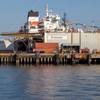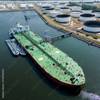Marine Environment Protection Committee to Address Sulphur Limit Implementation
International Maritime Organization (IMO)'s Marine Environment Protection Committee (MEPC 73) has begun a busy session (22-26 October).
On Monday, the MEPC moved ahead with its work to deliver the IMO initial strategy on the reduction of greenhouse gas emissions from ships, approving a programme of follow-up actions.
A working group on GHG reduction will continue discussions, including the scope of the fourth IMO GHG study.
The Committee will address the implementation of the 0.50% sulphur limit. From 1 January 2020, the limit for sulphur in fuel oil used on board ships operating outside designated emission control areas will be reduced to 0.50% m/m (mass by mass). This will significantly reduce the amount of sulphur oxides emanating from ships and should have major health and environmental benefits.
IMO has been working with Member States and the industry to support implementation of the new limit. MEPC 73 is expected to approve ship implementation planning guidance as well as best practice guides for Member States/coastal States and for fuel oil suppliers.
The Committee is also expected to adopt an amendment to prohibit the carriage of non-compliant fuel oil (except when ships are fitted with measures such as exhaust gas cleaning systems or “scrubbers”).
Marine plastic litter is another key agenda item. The Committee is expected to develop and agree an action plan to address the issue of marine plastic litter from shipping, in the context of 2030 Sustainable Development Goal 14 (SDG 14) on the oceans.
A number of proposals have been put forward for consideration, covering issues such as a proposed study on the state of marine plastic litter; looking into the availability and adequacy of port reception facilities; looking at marking and retrieval of fishing gear; reporting the loss of fishing gear and containers; facilitating the delivery of retrieved fishing gear or passively-fished waste to shore facilities; reviewing training; raising awareness; and strengthening international cooperation.













